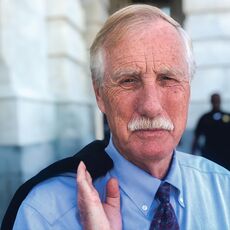
King talks ‘COVID 3.1,’ telehealth and broadband connectivity
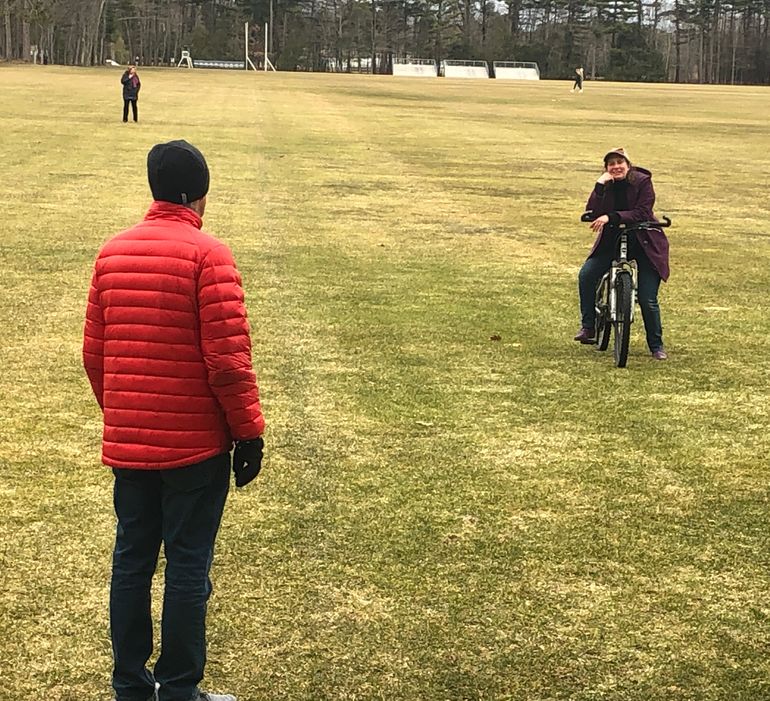 Courtesy/Office of U.S. Sen. Angus King
U.S. Sen Angus King, I-Maine, talked to Mainebiz on Thursday from his self-quarantine in Brunswick. He is shown here talking to a constituent while practicing social distancing.
Courtesy/Office of U.S. Sen. Angus King
U.S. Sen Angus King, I-Maine, talked to Mainebiz on Thursday from his self-quarantine in Brunswick. He is shown here talking to a constituent while practicing social distancing.
More Information
While self-quarantining in a Brunswick hotel for 14 days during the congressional recess, U.S. Sen. Angus King, I-Maine, chatted with Mainebiz on Thursday. A phone interview that's excerpted below covered topics from the federal response to the public health crisis to telehealth (more on that in Monday’s Daily Report) and broadband connectivity.
Mainebiz: Will there be a "COVID 4" — a fourth federal response bill?
Angus King: There will likely be, [but] it’s unclear now what the shape of it will be. Some people are talking about the core of it being infrastructure. But I think there’ll be a COVID 3.1, where we repair or address some of the defects in what we just passed, or provide clearer guidance to the administration, if they’re executing the provisions of the bill in a way that’s inconsistent with what was intended. Remember, this is the biggest one-time appropriation in the history of this country, and it was an incredibly complex piece of legislation and was done in a real hurry for obvious reasons. That means that there are inevitably going to be either outright mistakes or unintended consequences that are going to have to be addressed. That will be the first step, and then there will probably be another bill coming on, probably much later in the spring.
MB: Does an infrastructure bill have a better chance after today’s staggering jobless numbers?
AK: Yes, I think there be a consensus this is something we ought to do. The question always is how do we pay for it? Everybody’s for fixing the roads, but people aren’t necessarily crazy about paying a higher gas tax, so that’s going to have to be part of the discussion.
MB: With so many health care providers now ramping up telehealth, what do you see as the main benefits?
AK: The first thing is, obviously it allows people to visit with physicians or medical practices without having to go out, without having to go into an environment that may entail some measure of risk, so they can be triaged remotely, and then if they exhibit the symptoms and the doctor determines that they’ve got something that needs further medical help, they can bring them in. It’s a way of keeping people out of the emergency room who don’t need to be there, so it’s very useful in this setting.

Secondly, it’s very useful in a state like Maine with a large rural population, and particularly elderly people for whom transportation is a challenge. What’s really exciting is the development of platforms like Zoom, that you don’t need a lot of special equipment. A patient in a house on the outskirts of Sangerville, or in the outskirts of Dover-Foxcroft, can be in touch and be seen by a physician, much easier and more efficiently than would be the case if they had to find a ride and wait in a waiting room with a lot of other people.
MB: And the barriers?
AK: It doesn’t work if you don’t have broadband. This crisis has really brought into stark relief the gap in terms of broadband accessibility, particularly in rural states. We’ve got rural people that could very beneficially be connecting with their physicians, who have difficulty or who can’t because of a lack of broadband, and we’ve got thousands of kids out of school who can’t connect with their schools or their teachers because of a lack of broadband, so that has to be a huge national priority. The second problem with telehealth is regulation, and I’m happy to say that the the COVID-3 bill that just passed eased up on some of the regulation.
MB: Do you see telehealth becoming part of the health care system when we get back to normal?
AK: Absolutely — it makes total sense. If you just need to talk to a doctor and describe your symptoms, and show the rash on your arm, that could be done electronically. A doctor can see more people, people can in effect get to the doctor more easily. One of the most expensive parts of our health care system is the emergency room, and to the extent we can triage people electronically, and keep them out of the emergency room, when it’s not necessary, that will be saving to the entire health care system and it will provide better care to the patient.
MB: On the COVID-19 testing front, Anthem Blue Cross and Blue Shield in Maine and urgent care company ConvenientMD announced plans to open a drive-through site in South Portland. Is it up to individual providers to open more testing facilities?
AK: That's a really good question — who's in charge? There are whole lot of pieces to the testing question. There are swabs, there are chemicals. I am just finishing up a letter today to [Vice President Mike Pence] about the shortage of chemical supplies, basic chemicals that are necessary. And then you have to have the personnel, you have to the protective equipment and all that. So I think you’re going to see more of these set up probably under the auspices of our existing health providers.
MB: Finally, do you have any words of encouragement to the health care workers on the front lines of the crisis?
AK: Yesterday, as a matter of fact, I sent a video "thank you" to MaineHealth for them to pass on to all of their front-line medical personnel, basically expressing my appreciation and deep thanks for what they’re doing. They’re not only helping people and saving lives, but they’re doing so at some risk to themselves, and I think we need to recognize that. That’s why people like me and others are working so hard to be sure they have the protective equipment they need to have, to do the incredibly essential work that they’re doing safely. My message is: Thank you, and we’re going to work on every way we can to keep you safe.





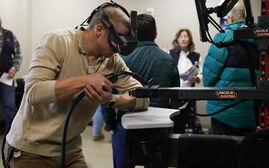
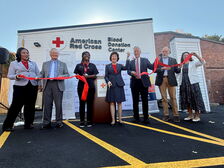

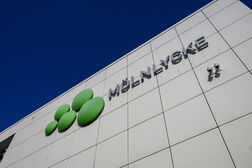




0 Comments